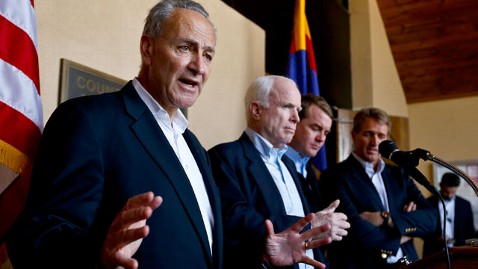Avoiding Stumbling Blocks on the Pathway to Citizenship

Ross D. Franklin/AP Photo
ANALYSIS By JIM AVILA
So eight senators have agreed on a "pathway to citizenship" for America's undocumented, leaving a mere 92 to go. And make no mistake, there are many stumbling blocks on this road to legalization.
Pro-pathway advocates are concerned that too many people are being left out, because anyone here after December 2011 will not be eligible for citizenship and will still be vulnerable to deportation.
For many on the other side, the border will never be secure enough, even if this new immigration reform bill does call for $4.5 million in funding for new border patrol agents, equipment including drones and more security fencing.
Plus history is working against the bill. A similar version failed in 2007 because of conservative outcry.
But at the White House today after Senators John McCain and Charles Schumer say they received the president's seal of approval on the legislation, quote "very supportive of the bill" the two senators defended its chances, saying the American people have changed since 2007.
Americans' views of immigration have pushed to support by a 2-1 margin.
According to a newly released ABC News/Washington Post poll, Americans were evenly split on the issue (49 percent to 46 percent) in 2007, whereas today that number is 63 percent to 33 percent.
That may mean the difference between the 2012 bill's passage and the 2007 bill's demise. Schumer said the fact that labor is on board now, when in 2007 they were most definitely not, means this bill has a greater chance of success.
Attitude of American people has changed since 2007," McCain said at the press briefing today, including the effect of the Latino turnout in the election of President Obama, which he said "quite frankly" had an "impact as well."
When it comes to the "path to citizenship," 57 percent support it. Whether they will support the path now that it is officially outlined, begs another question.
The "pathway to citizenship," which would allow many of the 11 million undocumented immigrants eventually to become citizens, requires immigrants to be free of felony convictions and pay a $500 penalty fee, plus back taxes.
"If you have to register, go to back of line, learn English, work, admit wrongdoing and pay a significant fine … that's not amnesty in anyone's book," Schumer said.
Those who qualify would gain legal status immediately, but go to the end of the line for citizenship. After a 10-year wait, they would then be granted green cards, followed by full citizenship.
Sixty-nine percent of those polled by ABC/Washington Post say taking 13 years, as has been suggested, and now outlined as part of the senate legislation, would be too long.
It seems on the aspect of allowing more visas for highly skilled and low skilled workers, the members of the Gang of 8 were listening to the American public. Americans support those two programs by 60 percent and 56 percent respectively.
E-verify, which will be required by all employers within the next five years, as outlined will allow American citizens to "lock" their Social Security so others cannot use it to apply for a job. The ABC News/Washington Post poll found 83 percent favoring business checks. For the senators of the draft bill, this point will help to curb illegal entry.
"The employer will not be able to hire someone who's in this country illegally," McCain said. "Even if you get into this country, there's not going to be a job there."
Bottom line for the Gang of 8: a conviction that public support will smooth over those stumbling blocks on the pathway to citizenship.